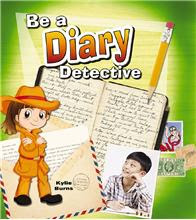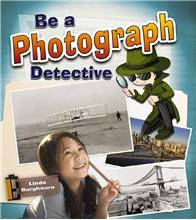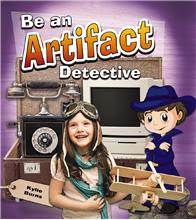| ________________
CM . . . . Volume XXIV Number 6. . . . October 13, 2017

 |
Be a Diary Detective (Be a Document Detective).
Kylie Burns.
St. Catharines, ON: Crabtree, 2017.
24 pp., pbk., hc., & html, $8.95 (pbk.), $22.95 (List RLB), $18.36 (School RLB).
ISBN 978-0-7787-3081-1 (pbk.), ISBN 978-0-7787-3053-8 (RLB), ISBN 978 1 4271 1871-4 (html).
Subject Headings:
History-Research-Juvenile literature.
History-Sources-Juvenile literature.
History-Methodology-Juvenile literature.
Biographical sources-Juvenile literature.
Diaries-Juvenile literature.
Letters-Juvenile literature.
Grades 2-4 / Ages 7-9.
Review by Suzanne Pierson.
**** /4
|
 |
Be a Photograph Detective (Be a Document Detective).
Linda Barghoorn.
St. Catharines, ON: Crabtree, 2017.
24 pp., pbk., hc., & html, $8.95 (pbk.), $22.95 (List RLB), $18.36 (School RLB).
ISBN 978-0-7787-3093-4 (pbk.), ISBN 978-0-7787-3079-8 (RLB), ISBN 978-1-4271-1873-8 (html).
Subject Headings:
History-Research-Juvenile literature.
History-Sources-Juvenile literature.
History-Methodology-Juvenile literature.
Photographs-Research-Juvenile literature.
Photographs as information resources-Juvenile literature.
Grades 2-4 / Ages 7-9.
Review by Suzanne Pierson.
**** /4
|
 |
Be a Speech Detective (Be a Document Detective).
Linda Barghoorn.
St. Catharines, ON: Crabtree, 2017.
24 pp., pbk., hc., & html, $8.95 (pbk.), $22.95 (List RLB), $18.36 (School RLB).
ISBN 978-0-7787-3094-1 (pbk.), ISBN 978-0-7787-3079-8 (RLB), ISBN 978-1-4271-1873-8 (html).
Subject Headings:
History-Research-Juvenile literature.
History-Sources-Juvenile literature.
History-Methodology-Juvenile literature.
Speeches, addresses, etc.-Research-Juvenile literature.
Oral history-Juvenile literature.
Grades 2-4 / Ages 7-9.
Review by Suzanne Pierson.
**** /4
|
 |
Be an Artifact Detective (Be a Document Detective).
Kylie Burns.
St. Catharines, ON: Crabtree, 2017.
24 pp., pbk., hc., & html, $8.95 (pbk.), $22.95 (List RLB), $18.36 (School RLB).
ISBN 978-0-7787-3080-4 (pbk.), ISBN 978-0-7787-3039-2 (RLB), ISBN 978-1-4271-1870-7 (html).
Subject Headings:
History- Research-Juvenile literature.
History-Sources-Juvenile literature.
History-Methodology-Juvenile literature.
Antiquities-Juvenile literature.
Material culture-Juvenile literature.
Grades 2-4 / Ages 7-9.
Review by Suzanne Pierson.
**** /4
|
| |
|

excerpt:
Speeches, oral histories, and interviews give us one person’s feelings and opinions about an event they were part of. People at the same event may have very different experiences. So it is always important for document detectives, like you, to study many different primary sources. (From Be a Speech Detective.)
Wow! A series that lives up to the publicity blurb.
”Be a Document Detective” is an engaging series that introduces young readers to primary sources and explores their role in historical inquiry. Accessible, well-crafted text supports readers as they learn to ask questions to identify and evaluate primary sources. Critical thinking questions encourage active learning and close analysis of primary sources materials.
Crabtree Publishing sent the above promotional blurb with the books to be reviewed, and, for once, I couldn’t agree with them more. All four books in this new series are winners. Aimed at young students who can read for meaning, these books are very effective in informing students about the importance of examining primary sources such as diaries, photographs, artifacts, and interviews. Each of the four books, “Be a Diary Detective”, “Be a Photograph Detective”, “Be a Speech Detective” and “Be an Artifact Detective”, looks specifically at the who, what, where, when, why, and how to learn from a specific type of primary source material.
The books follow the standard format for nonfiction text, with a table of contents at the beginning, and a simple glossary, index and additional resources list at the back of the books. The information is divided into chapters with clear titles, such as “How to be a Speech Detective” and “Learning from Letters”. The clearly written text is supported by well-chosen photographs of primary source material and photographs of young male and female students from many ethnic backgrounds examining the primary source materials.
The books teach students how to think critically through the examples that are examined, and they provide opportunities to engage with the text.
“Can you think of other ways technology helps us keep track of our lives today?”
(From Be a Diary Detective.)
Be a Diary Detective uses examples of diaries kept by young people in Canada and the United States, as well as famous people. Using colour-coded text boxes, the book helps readers interpret the significance of the diary entries.
We have learned that it was warm in Upper Canada in March that year.
Modern means of recording details of our lives, such as video diaries and blogs, are also discussed.
Be a Photograph Detective helps students look for clues in historic and modern photographs. In the chapter, “A Timeline”, students examine three photographs.
Study the photographs and use the clues you find to help you place the photographs on a timeline. Compare your timeline with others. Discuss the clues you used to help you create your timeline. Did your friends use different clues?
Be a Speech Detective examines oral history as a primary source. Examples of famous speeches include a speech by Malala Yousafzai at the United Nations and a victory speech by Barack Obama. Another example is a story told by Sandra Big Canoe about surviving a trip across Lake Simcoe, ON, in a storm on a little ferry.
Be an Artifact Detective defines artifact as an “object that people created or used”. After reading about artifacts from the past, students are challenged to choose three objects that they use daily that will help future “artifact detectives” learn about life today. Additionally, the students are asked to explain their choices.
Be a Document Detective series is an excellent resource to support the Language Arts curriculum. Understanding the significance of what primary source material is and learning how to use the material to uncover clues about the past are important steps to develop strong research skills such as thinking critically and checking reliability.
Highly Recommended.
Suzanne Pierson, a retired teacher-librarian, is currently instructing librarianship courses at Queen’s University in Kingston, ON.

To comment on this title or this review, send mail to cm@umanitoba.ca.
© CM Association
CC BY-NC-ND
Hosted by the University of Manitoba. |
This Creative Commons license allows you to download the review and share it with others as long as you credit the CM Association. You cannot change the review in any way or use it commercially.
Commercial use is available through a contract with the CM Association. This Creative Commons license allows publishers whose works are being reviewed to download and share said CM reviews provided you credit the CM Association. |
Next Review |
Table of Contents for This Issue
- October 13, 2017.
CM Home
| Back Issues
| Search
| CM Archive
| Profiles Archive
|



